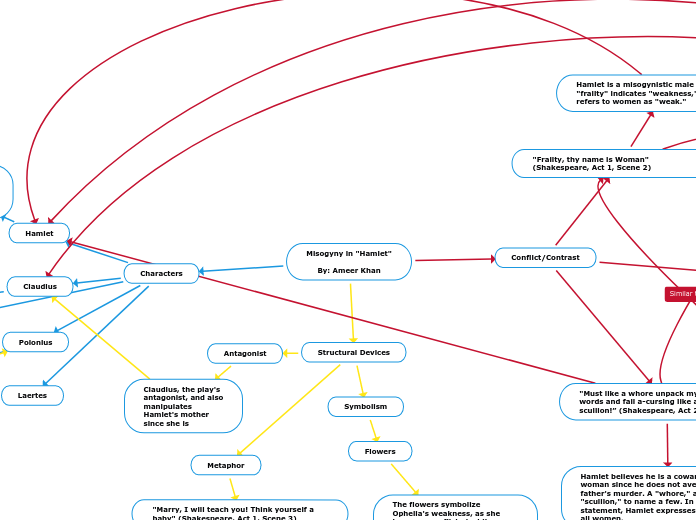Misogyny in "Hamlet"
By: Ameer Khan
Conflict/Contrast
"To do obsequious sorrow. But to persever,
In obstinate condolement is a course
Of impious stubbornness. 'Tis unmanly grief"
Claudius says that any expression of sadness or grief is "unmanly," referring to it as a woman's acts, while Hamlet mourns his father's death. This is similar to Hamlet's description of women as "weak."
"Must like a whore unpack my heart with words and fall a-cursing like a very drab, a scullion!” (Shakespeare, Act 2, Scene 2)
Hamlet believes he is a coward like a woman since he does not avenge his father's murder. A "whore," a "drab," and a "scullion," to name a few. In this statement, Hamlet expresses his hatred for all women.
"Frailty, thy name is Woman" (Shakespeare, Act 1, Scene 2)
The male characters in the play constantly make mockery of women and regard them as inferior to them.
Hamlet is a misogynistic male because "frailty" indicates "weakness," hence he refers to women as "weak."
Characters
Female characters are treated with hatred by the male characters. They are controlled and considered inferior to the men.
Ophelia
Naïve character who is easily manipulated by the men in the play.
Gertrude
Highly reliant on the men in her life and used as as an object.
Laertes
Polonius
Acts as though he knows Ophelia better than she knows herself, treating her as inferior and instructing her what to do.
Claudius
Controls Gertrude and uses her for his sexual desires
Hamlet
Protagonist of the play. Very misogynestic male who belittles women throughout the play.
Structural Devices
Symbolism
Flowers
The flowers symbolize Ophelia's weakness, as she becomes conflicted while Hamlet taunts her after her father dies. Instead of comforting her after her father's death, Hamlet mocks her, demonstrating his misogynistic mentality.
Antagonist
Claudius, the play's antagonist, and also manipulates Hamlet's mother since she is
Metaphor
"Marry, I will teach you! Think yourself a baby" (Shakespeare, Act 1, Scene 3)
Polonius compares Ophelia to a baby while talking to her, implying that she is dumb and naive for trusting in her emotions for Hamlet.

